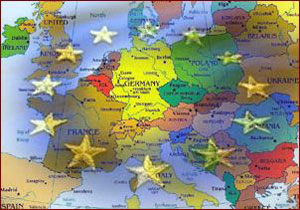EU – Baltic States, Integration, Legislation
International Internet Magazine. Baltic States news & analytics
Wednesday, 21.01.2026, 13:52
Challenges of hope: Europeans vote conservative
 Print version
Print version |
|---|
The European Union was created with the main aim to streamline “European model” of significant government involvement in social and economic affairs, in supervision of financial activity, in state-run pensions and health care and in pursuing sustainable development based on modern science and technology. All went on smoothly during last 50 years until the crisis in financial and economic affairs has shed great shadows over European development. Some experts in IMF even argue that Europe is suffering more than the US partners during the present crisis: European banks hold more toxic assets than those in the US and they have written down less. Budget deficits are rising and unemployment is at its highest in the last 10 years, especially among the young.
The EU finds itself in a set of antagonisms – even Europe’s most devoted advocates slowed down their ambitions arguing that Europe is not any more a significant political and military counterweight to the US.
There is a general feeling of dissatisfaction and helplessness among the European population, and the EP elections have clearly shown it in the formation of the only elected institution in the European Union.
EU political panorama
Despite the worst economic crisis in Europe, left parties on the continent failed to make a difference in politics: after four days of voting the center-right parties have kept majority in the EP. This EU institution is gaining power and competence in decision-making, in particular since the TEU Treaty in 1992. This is even more confusing as the EP would serve –at least supposed to – greater role in common EU economic policy issues. Socialists and Social Democrats failed to convince voters in all major EU states that they had credible alternatives to take EU economy out of the slump. Conservative and center-right parties and governments seemed a safer choice in the crises for Europeans.
Table: Structure of the new EP (in brackets-previous EP members)
Party/Group
Seats
Share, % (changed,%)
Christian Democrats/European Democrats-PPE-DE
263 (288)
35,7% (-1.0)
Socialists/European Social Democrats- PSE
161 (216)
21,9% (-5.7)
Liberals to the Alliance of Liberals and Democrats for Europe –Liberals
80 (100)
10,9% (-1,8)
Union for Europe of the Nations -U.E.N.
35 (44)
4,8% (-0,8)
Greens/European Free Alliance - Greens/E.F.A.
52 (43)
7,1% (+1,6)
European United Left/Nordic Green Left - E.U.L./N.G.L.
33 (41)
4,5% (-0,7)
Independence/Democracy Group -Ind/Dem
19 (22)
2,6% (-0.2)
Non-affiliated -NI
93 (30)
12,6% (+8,8)
Total
736 (784)
New trends
Analyzing the election's results at least three main features can be underlined:
- European elections (for the seventh time in the EP's history) have shown a stable conservative trend in popular perceptions since 1990s, i.e. Europe has definitely moved to the right in political spectrum. Thus, the difference between the conservative party-group in the old and the new EP and the socialist group increased to more than 100 MEPs (compared to 71 MEPs in the previous EP);
- At the same time, economic crisis produced an unknown before the level of abstention among European electorate. On average about 56 per cent ignored the elections this year, against 37 per cent at the first EP elections in 1979;
- Strong popular support for “green movement”: after liberals with 80 MEPs in the new EP the “greens” occupy the fourth noble place.
Securing integration path
Still European integration must continue: sooner or later the Lisbon Reform Treaty will be approved and the EU institutions will acquire new and enlarged competences.
However, new elections to the EP have shown that voters are not attaching important political relevance to this institution: about 60 per cent eligible to vote abstained. The right parties’ victory has much to do with the left parties’ division and disarray, e.g. in Germany, France, the UK, Spain, Italy and other states.
Still, the conservatives’ victory in the EP elections is not to be seen as an end to constructive European integration. The vote has shown a public “healthy skepticism” to business as usual in EU politics; it does not mean a return to the days of unbridled free market. Leaders in France and Germany have persistently campaigned for more regulated financial sector and capitalist system as such.
The new EP is facing a tough time of combining the new trends in politics with more regulated “financial and economic capitalism” while preserving the European integration.








 «The Baltic Course» Is Sold and Stays in Business!
«The Baltic Course» Is Sold and Stays in Business!

